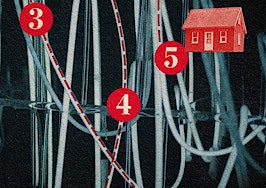Erica Ramus is an indie broker and a tech geek in Pennsylvania. Her regular monthly column publishes on Thursdays and covers and array of topics including recruiting, independent brokerage, technology and social issues.
My last Inman broker column, “How to make sure your agents follow up on internet leads,” got some interesting private messages and emails from both brokers and agents. Because this generated such interest offline, I thought I’d dive deeper into the topic this month.
Regarding technology adoption in general, the question came up as to how to increase the adoption rate. Some brokers spend a lot of money on providing the agents with technology packages. These might include electronic forms, digital signature packages, cloud transaction rooms, a CRM platform — all on top of internet leads.
Yet we hear that for many brokerages, agent adoption rates are disappointing. Are brokers wasting their time and money seeking out tech solutions that will help agents who simply don’t want to use it?
If “we provide the tech” is such a rallying cry for recruitment, why don’t more agents jump on board when it’s available? I asked around and got a few different answers.
If it ain’t broke …
Agents are creatures of habit, and most don’t like change. A fancy new program may sound great in theory, but when the boots-on-the-ground agent needs to get something done, they may resort to the old familiar rather than learn a new program.
One of my broker clients has a massively successful top producer who still uses index cards to log his showings and keep track of buyer clients. This broker provides a fantastic CRM to all, but this old-school agent rocks it with index cards wrapped in a rubber band. He won’t switch to the new CRM, and that’s OK.
The one-third rule
I have found that no matter what I roll out to the office, one-third will eagerly jump on board and immediately “get with the program.”
The middle third will do it because I asked them to do it, and they will eventually get on board. They will be reluctant adopters who must be convinced this new thing will save them time or will make them more money in the end.
The final third will resist or not even attempt to use the system. If the program is mandatory (such as a transaction management system) and they won’t use it, either the broker will have to implement a work around, or the agent will leave.
For example, a seasoned agent who only turns in paper files and won’t upload to the transaction room may be accommodated by an admin scanning and uploading their files. The question to the broker is this: Is the agent’s production and value worth creating a work around, or should they be let go?
Fear of broker oversight
Interestingly, more than one person mentioned to me that they may choose to not use a broker-provided CRM or other broker tech because they don’t want the broker to have access to their client database.
In many broker-provided platforms, the broker can see all agent interactions with the client — texts, emails, notes, etc.
I require my agents to use our system specifically because of this trail of contact. If something happens, and I need to reference the file, the notes are there. I can see what the buyer or seller said, and how the agent replied.
Some agents don’t want this level of oversight — yet the clients are actually the clients of the broker, and the agent is acting under the broker’s supervision. Having a log of correspondence and notes helps me understand the file better when things go sideways. When an upset client calls the office, the first thing I do is check the transaction room file and look in the CRM for notes.
Then I call the agent, with this information at my fingertips. Agents who have an issue with me having access to their client files and CRM wouldn’t be a good fit for my office. I understand this but as a broker I want this access to be able to protect the company and the agents, if something goes wrong with a transaction.
I understand that some agents are protective of their client lists. Again, all clients of the agent are first (by law) clients of the broker. Honestly, if you are afraid of sharing your notes or database with your broker — because your broker might steal your clients or transfer them to another agent if you leave — then you don’t trust your broker. A solid agent/client relationship will survive an agent switching offices.
In fact, I believe it transcends the office. Your name should matter more to the buyer or seller than the office name, if they truly are “your client.” You only have something to worry about if the firm does a better job at building a relationship with the client than you do.
Accountability rules
I received messages asking me if I really practice what I preach regarding internet lead accountability. Yes. I turn on or off the internet lead flow to an agent based on their performance.
An agent who does not follow the rules I have set out for internet lead follow up is shut off the flow until they do more training on the system, or show me they are committed to the way we work leads.
The system works — if you work it. I get tired of whining “Zillow leads suck” or “internet buyers are useless.” If I am paying for the platform and the leads, then I expect my agents to work the system to standards I know work. I don’t do round robin or equal lead distribution.
Leads go to the agents who are available to work them, who reply quickly and correctly, and who convert. We track performance and coach those who may be struggling. If you don’t respond to coaching, then you probably are not a good fit for our team.
If you are an agent paying for your own leads, then you understand this. If you are a broker who is distributing leads to agents, this is running your business like a business. You should be allocating dollars (leads) to those who are best suited to making you a good return on your investment. Fairness doesn’t even come into play, in my mind.
Those who convert deserve the lion’s share of the leads. Those who fail to convert either step up to the plate and get more training, learning how to work the system or must fend for themselves.
As a final thought, technology is only as good as the person using it. Agents, and brokers, tend to buy into programs and systems because they think it will be the magic elixir to closings: “Spend X per month on my new tech, and I’ll make you more successful, bring you more buyers/sellers, and you will make a ton of money.” I have news for you: Tech alone doesn’t make you money.
I am a huge tech geek. I am an early adopter and real estate nerd. I promise you that you can spend huge amounts of money on technology and still fail at this business.
Nobody can guarantee you one or two or 10 more closings because you pay for their system. You still have to do the work. You have to put in the hours and show up. Technology is great, as a facilitator and tool.
You — the agents and the brokers — still have to work the system and show up. There is no “easy button” in real estate.
Erica Ramus, MRE, is the broker/owner of RAMUS Real Estate. You can follow her on Twitter or LinkedIn.













